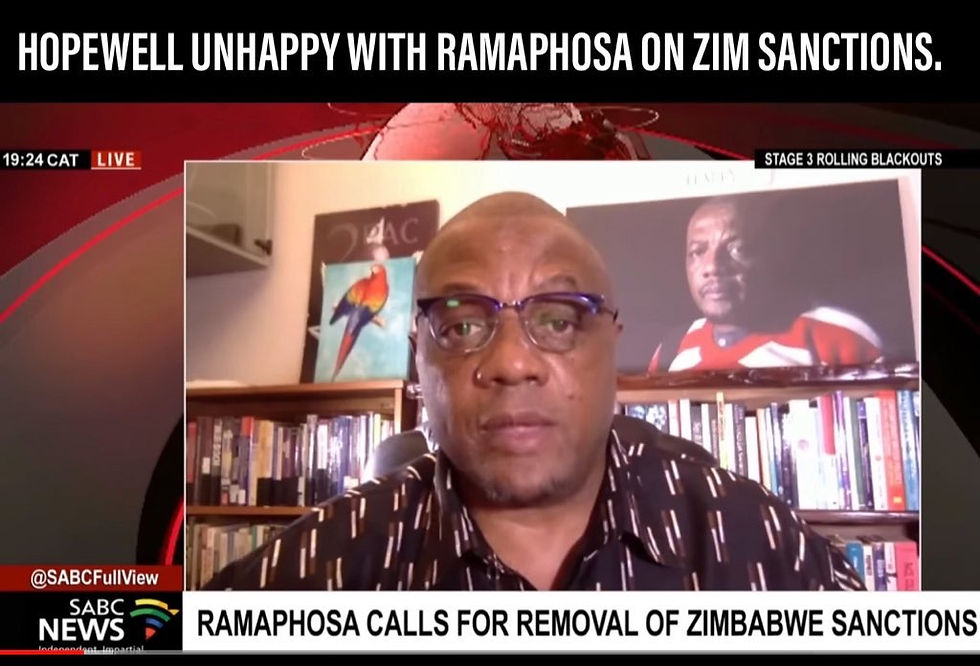WHY HOPEWELL WILL NEVER TURN SANCTIONS NARRATIVE.
- rutendo matinyarare

- Apr 11, 2023
- 4 min read

Hopewell finds it difficult to accept that the “it’s corruption” narrative around sanctions has changed forever and will never return. This is why he continues to criticize President Cyril Ramaphosa's attribution of the economic and humanitarian crisis in Zimbabwe, to sanctions.
However, Hopewell fails to acknowledge that the South African government didn't come to this conclusion lightly, but they:
1. Commissioned a panel of professors and Ph.D. holding experts in various fields, to conduct a year-long study to determine the root cause of Zimbabwe's problems, which led them to conclude that sanctions were the issue.
2. 28 October 2021, The UN Human Rights Council, then released a report which supported this conclusion and highlighted the harmful impact of sanctions on Zimbabwe. It illustrated that sanctions were hampering government service delivery; leading to economic destruction, deindustrialization and causing refugees to flee to neighbouring countries, such as South Africa and the rest of SADC.
3. This was not a coincidence but it was due to a strategic and sustained campaign by ZASM and others, to demystify the nature of Zimbabwean sanctions, demonstrate their impacts and reveal that they were collective punishment of all Zimbabweans without due legal process. These efforts thus shifted the focus of the fight against sanctions from politics, to a legal and human rights-driven campaign.
4. The campaign continued to gain momentum, with efforts to depoliticize sanctions and make them a national, regional, multilateral and legal matter in SADC, AU and the UN. This approach led to the adoption of 25 October as Anti-Sanctions Day in SADC since 2019 - a resolution of SADC’s support for the fight against Zimbabwean sanctions.
5. Central to the strategy was garnering legitimacy for the government and nation through involving the UN, so that they could confirm that Zimbabwe was under illegal persecution from sanctions that resulted in external displacement of civilians into neighboring countries, posing a regional security threat.
6. By October 2021, when the UN Special Rapporteur visited Zimbabwe and Hopewell invited me to his Twitter Space with the EU and U.S. ambassadors. In the debate, I was able to expose the lies of the ambassadors on the issue of sanctions.
In front of thousands, I exposed the U.S. Ambassador to the point where he admitted that their sanctions were punishment without trial and Hopewell redacted the embarrassing admissions from the YouTube recording of the debate that he posted online.
This act of exposing the ambassadors' lies, helped put the final nail in the coffin of the “it’s corruption” and “there is no sanctions on Zimbabweans” propaganda, to win us the battle on sanctions in front of SA officials.
8. As a result, in February 2022, three months after the Twitter debate and release of the UN Human Rights Council report in October 2021, the EU removed all its sanctions except those on ZDI (Zimbabwe Defense Industries), as they had been condemned by the UN.
9. Prior to that, late April 2021, a representative of the US government had reached out to me asking to lobby on our behalf for the removal of sanctions on civilians. However, I stated that we would only be interested if the lobbying was done to remove sanctions on all Zimbabweans, including politicians punished without trial. We also pointed out that the US government had not carried out impact assessments of their sanctions since they were put in place 20 years before.
10. A month later, 23rd of May 2021, the US Congress Subcommittee on human rights, health, and organization wrote to POLAD, informing them that for the first time in history, they intended to conduct an impact assessment of their sanctions on human rights and health in Zimbabwe and Africa, with the aim of removing those sanctions that affected civilians, despite claiming they had no sanctions against civilians.
11. To demonstrate our dedication to legally fighting sanctions, we as an organization (ZASM) filed a case against the U.S. President, some U.S. officials and South African domicile banks in South African courts, in February 2021, for their illegal imposition and implementation of illegal sanctions.
12. Throughout this legal process, the South African government has been serving papers on the U.S. government through DIRCO, and observing their behavior which helped cement their position on supporting Zimbabwe fight sanctions.
The South African government saw the arrogance and disregard the Americans have for the well-being and of their ally (South Africa) which is suffering from the refugees being displaced by their sanctions. They also saw their obduracy toward black humanity and this moved them away from believing the US narrative of corruption destroying Zimbabwe, which they once believed. This why Hopewell fighting to reverse the narrative is a futile effort because the truth has set our neighbors, the AU and UN free as witnessed in the 33/13 vote against sanctions last week in the UN Human Rights Council.
In fact, our work and America’s own arrogance has led even the ANC Secretary General to denounce sanctions and the CCC as a puppet government, attempting to destabilize Zimbabwe by sanctions for regime change.
The horse has bolted and we have won the battle of the minds on sanctions.








![Reflecting on Mugabe's leadership with Rutendo Matinyerere[via torchbrowser.com]](https://static.wixstatic.com/media/bc543e_1f43fc03f32c421a886bfe7e89765b34f002.jpg/v1/fill/w_320,h_180,enc_auto/file.jpeg 1x, https://static.wixstatic.com/media/bc543e_1f43fc03f32c421a886bfe7e89765b34f002.jpg/v1/fill/w_640,h_360,enc_auto/file.jpeg 2x, https://static.wixstatic.com/media/bc543e_1f43fc03f32c421a886bfe7e89765b34f002.jpg/v1/fill/w_960,h_540,enc_auto/file.jpeg 3x)
![State of Zimbabwe economy under sanctions- Rutendo Matinyarare[via torchbrowser.com]](https://static.wixstatic.com/media/bc543e_9f02c3d9ed0d478f9fc73604d04dc3a9f002.jpg/v1/fill/w_320,h_180,enc_auto/file.jpeg 1x, https://static.wixstatic.com/media/bc543e_9f02c3d9ed0d478f9fc73604d04dc3a9f002.jpg/v1/fill/w_640,h_360,enc_auto/file.jpeg 2x, https://static.wixstatic.com/media/bc543e_9f02c3d9ed0d478f9fc73604d04dc3a9f002.jpg/v1/fill/w_960,h_540,enc_auto/file.jpeg 3x)





Comments